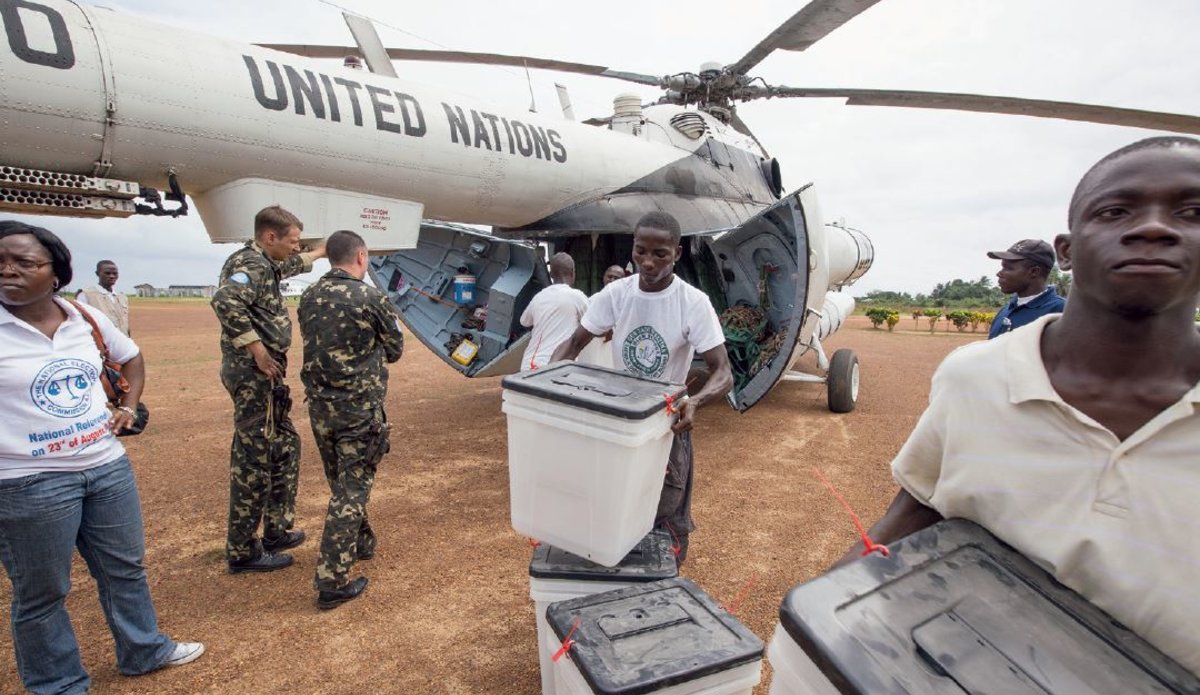The story of UNMIL [Book]: Support to elections

UNMIL provided support to three elections and was an important enabler in their success. Liberia is a country with poor road infrastructure so during the wet season when the election is held, it’s extremely difficult to move ballot materials around the country. In the 2005 election, UNMIL had a mandate to help organize the elections. The National Electoral Commission and the Government saw UNMIL as a great enabler. In 2011, the Mission’s mandate was more limited, but UNMIL again provided logistical support. In 2017, the Liberians ran the elections, with the assistance of logistical support from UNMIL, including air lifting election materials, as the Government has no aviation capacity. We viewed the elections as a key activity. Having a stable Government before the Mission leaves is a must.
So, once again, in 2017 we faced some real challenges. The elections were held in October nearing the end of the wet season. The Chinese military engineers and transport units, key enablers, had been repatriated in February, 2017. Their road repair work stopped as part of the downsizing. So not only did the roads deteriorate through regular use, but the torrential rains and flooding brought on by the wet season further damaged them, making it difficult to move material on the ground. Election material had to be moved as close to the time of the election as possible to avoid possible storage, security or voting irregularity issues, so transport delays were a real risk.
We were delivering ballot material right up to the last day, but to do this we had to stop air military patrols and other mandated activities. The major concern then became that UNMIL was closing and the regional offices were to close by mid-December. Our helicopters were to stop operating in January 2018.
The kind of uncertainty around elections support is typical of the things that peacekeeping operations face. There’s always something new, unpredictable and ever-changing. We try and make the best call at the right time, and work the best way we can with the resources, options and capacity available at the time. We knew the elections had to be successful. We knew we needed to support them but the situation changed daily. We had to reorient and adapt. That’s why flexibility makes a big difference and why it’s important to have a flexible solution-orientated mindset in Mission Support.
 UN
UN United Nations Peacekeeping
United Nations Peacekeeping

![The story of UNMIL [Book]: Responsibility to protect - the environment The story of UNMIL [Book]: Responsibility to protect - the environment](https://unmil.unmissions.org/sites/default/files/styles/gallery_image_thumb/public/field/image/un_staff_and_liberian_school_children_participate_in_the.jpg?itok=ZvA2AFQs)
![The story of UNMIL [Book]: Women’s Situation Room prepares ground for calm elections The story of UNMIL [Book]: Women’s Situation Room prepares ground for calm elections](https://unmil.unmissions.org/sites/default/files/styles/gallery_image_thumb/public/field/image/councelor_yvette.jpg?itok=bCV6QvWZ)


